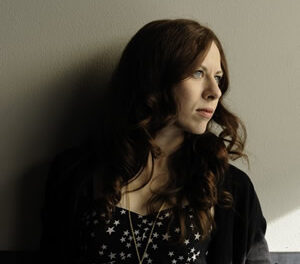A single work on a program can sometimes lead to interesting hours of background research. I found myself in this situation after hearing the curtain raiser at a concert by the University of North Carolina-Asheville’s University Singers. It wasn’t really a curtain raiser since there is no curtain in the lobby of Lipinsky Hall. Melodie Galloway, director of the 54-member chorus, chose that lobby, rather than Lipinsky Hall, in order to have an acoustically more intimate and interesting space. That choice was auspicious in the case of the first selection.
“Anoj Pusej Dunojelio” is a 2006 setting by Vaclovas Augustinas of a Lithuanian folk song. The title translates as “Other Side Dunojelio” or, according to one source, “On the Other Side of the River,” although try as I might I cannot find a Dunojelio River in Lithuania. Vaclovas Augustinas is a Lithuanian choral conductor, director of the Vilnius-based choir Jauna Muzika since 1992. “Anoj Pusej Dunojelio” is noteworthy for its use of overtone singing, also known as harmonic singing or (ambiguously) as throat singing. The singer manipulates the resonances of the mouth, larynx and pharynx to create both the fundamental pitch and a selected overtone. “Anoj Pusej Dunojelio” began with the male members of the chorus generating a harmonic chant, above which soprano soloist Caitlin Sands began the simple folk tune. Dr. Galloway had the choir in a circle around the performance space, behind and to the sides of the audience, creating a haunting aural effect. I found a couple of YouTube recordings of the piece, in one of which a chorus used a similar configuration, but there is nothing that can replace a live performance of a three-dimensional “special effect.” As the saying goes, you had to have been there.
In remarks from the director’s music stand, Dr. Galloway described the theme of the program as “Let Justice Roll Down the Mountains.” The other thirteen selections were all from the music traditions of the Southern Appalachian region. There were Spirituals and a 1972 work, “In Remembrance,” by Jeffery Ames of Nashville, but most were folk songs from Scotland, Ireland and England that would have been familiar to residents of Buncombe County in 1800. Excellent arrangements were used, with luminaries such as Alice Parker, Robert Shaw, Robert De Cormier and Mack Wilberg among the credits.
English is not the most beautiful language for poetry or music, and there is always tension between the use of artificial pronunciation for vocal beauty (“Ska-boo-row”) and natural pronunciation for veracity (“Scarr-burr-row”) when singing folk music such as “Scarborough Fair.” On this occasion, the choice was natural pronunciation with a hint of a Western Carolina mountain accent in the vowels.
Many selections were performed a cappella, or had a simple accompaniment on guitar or drums. Others used a keyboard accompaniment, which unfortunately was rendered on a rather crass electronic keyboard. The very contemporary electronic keyboard destroyed the sense of antiquity of works such as “Scarborough Fair” and “I’ll Ay Call in By Yon Town” and I would have preferred the non-electronic sound of a piano.
The choir members sang many selections from memory. Even when they were using their music folders, they paid excellent attention to their conductor. An audience of several hundred expressed pleasure with the results of the hard work of a well-prepared choir.











